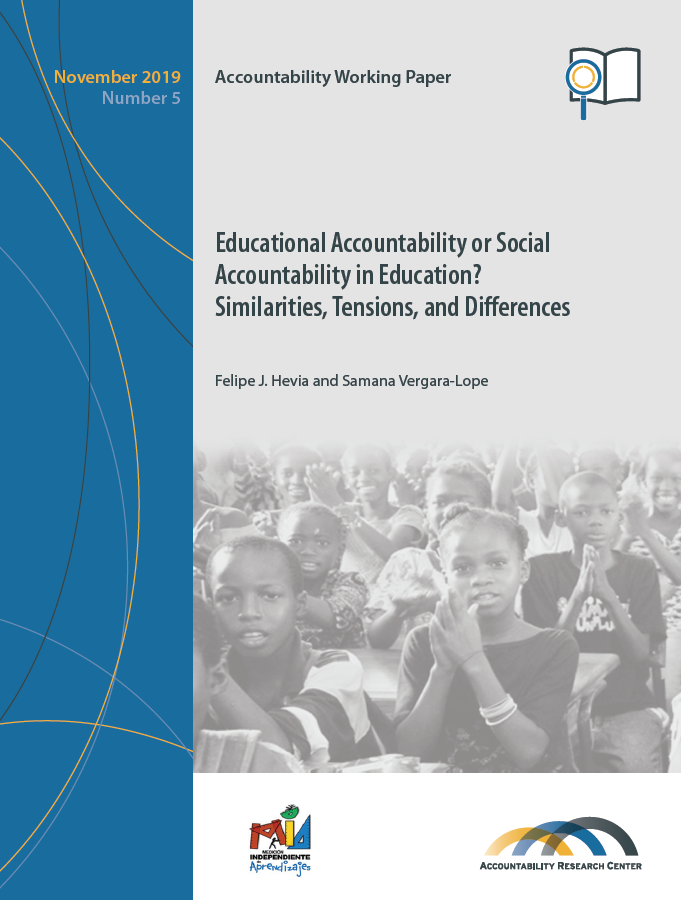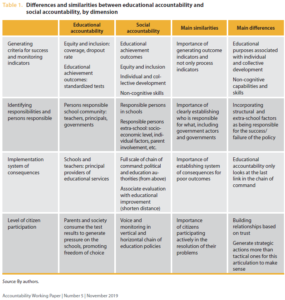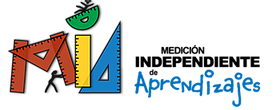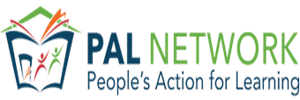
Educational Accountability or Social Accountability in Education? Similarities, Tensions, and Differences
Date: November 2019
Author(s): Felipe J. Hevia and Samana Vergara-Lope
Publication type: Working Paper
Published by: Medición Independiente de Aprendizajes and Accountability Research Center
Versión en español: ¿Accountability Educativo o Accountability Social en educación? Semejanzas, tensiones y diferencias. This article addresses the relationship between the concepts of Social Accountability and Educational Accountability. The analysis of the similarities, differences and tensions between these two different concepts can strengthen citizen participation for educational improvement by identifying the full range of actors and processes in decision making that influence the success or failure of educational policy beyond of the teachers. We encounter two distinctive features involving social accountability mechanisms in the field of education: (1) There are many actors who participate in education, making it difficult to identify precisely who is responsible for key decisions, and (2) In education policy one encounters the concept of educational accountability, which refers to a series of mechanisms to hold schools and teachers accountable for educational outcomes by adopting standardized tests on a widespread basis to motivate change and steady improvement. Are the approaches of social accountability and educational accountability compatible? What are their differences and similarities? What are the effects of these differences when it comes to formulating solutions to the crisis in education? Through a comparative analysis, and looking at the Mexican case in depth, it becomes clear that we have to examine more than the tip of the iceberg. The educational accountability perspective is insufficient and at times counterproductive for educational improvement because it has a series of biases that are centered on the symptoms more than the causes of the structural problems related to low education levels. These biases include (1) Reducing the criteria for assessing the success of education policies to the outcomes of standardized tests, (2) Identifying teachers as the main actors responsible for educational outcomes, without considering other associated factors, such as student characteristics and socio-economic factors, (3) The concentration of negative consequences in the last chain of interaction—teachers and schools—which disproportionately affects students and teachers, and (4) Difficulties in mobilizing citizens around the demand for a better education. The school and the teachers are the main providers of educational services, but their performance is not the only cause of educational outcomes. This is why we need to construct an expanded vision of social accountability in education, based on a human rights perspective all of the actors assume our responsibility inside and outside the schools, to facilitate: (1) The generation of broad and fair criteria of success for evaluating education policy, using various evaluation methodologies and the results to generate formative feedback; (2) To better identify those responsible and their responsibilities, focusing on those factors that improve equity and quality, increase students’ motivation to learn, reduce the burden of the socioeconomic inequalities, and help produce more supportive schools and teachers, and (3) The involvement of citizens to achieve better learning, build relationships based on mutual trust, and complement access to local information with policy monitoring throughout the chain of decision-making.

Felipe J. Hevia Felipe J. Hevia received his doctorate in Anthropology from Centro de Investigaciones y Estudios Superiores en Antropologia Social (CIESAS), where he has been a Research Professor since 2009. His research interests focus on citizen participation, accountability, poverty reduction and education. He has published 5 books and more than 60 articles and book chapters. His research has received awards from the Mexican Academy of Sciences, the University of Luxembourg, the RISC consortium, the UNDP, the IDB, the government of Brazil, the Chamber of Deputies of Mexico and the Latin American Council of Administration-CLAD. He is coordinator of the project Independent Measurement of Learning (MIA), and a member of the Mexican Academy of Sciences and the National System of Researchers of Mexico. fhevia@ciesas.edu.mx @fhevia Samana Vergara-Lope Samana Vergara-Lope received her doctorate in Psychology from the National Autonomous University of Mexico (UNAM). She has taught, participated in evaluation committees and directed multiple theses at the undergraduate and postgraduate level in different institutions of higher education. She has participated in the creation and validation of around 20 measurement instruments. Among her publications are two books and several chapters of books and articles in refereed scientific journals. She is currently a Full Time Professor at the Universidad Veracruzana, coordinator of the Independent Measurement of Learning (MIA) project and member of the National System of Researchers of Mexico. samanavergaralope@hotmail.com


